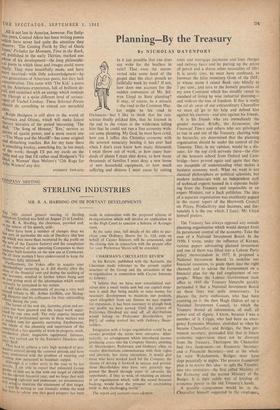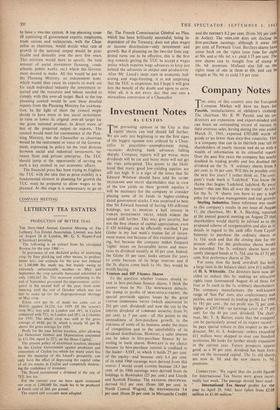Planning—By the Treasury
By NICHOLAS DAVENPORT Is it just possible that one does not write for the heathen in vain? That even the uncon- verted take some heed of the gospel that the elect preach so faithfully week by week? If not, how does one account for the sudden conversion of Mr. Sel- wyn Lloyd to State planning? It may, of course, be a miracle —the road to the Common Mar- ket might be his road to Damascus—but I like to think that his con- science finally pricked him, that he listened in the end to the voices in the wilderness telling him that he could not run a free economy with- out some planning. My God, he must have cried, how can I inflict this Christian economy with the severest monetary beating it has ever had when I don't even know how many thousands I must throw out of work, or how many hun- dreds of plants I must shut down, to how many thousands of families I must deny a new home or new household equipment, or how much suffering and distress I must cause by raising
rents and mortgage payments and loan charges and railway fares and by putting up the prices of petrol and a dozen other necessities of life! It is surely time, he must have confessed, to forswear the false monetary Gods of the IMF, in whose name I raised Bank rate blindly to 7 per cent., and turn to the homely practices of my own Continent which has steadily raised its standard of living by wise industrial planning— and without the loss of freedom. If that is really the ell de ca'ur of our extraordinary Chancellor we must all 'go to his help and defend him against his enemies--and also against his friends.
It is his friends who are immediately the greater menace. Briefly, the Economist, the Financial Times and others who are privileged to run in and out of. the Treasury, chatting with its hierarchs, are determined that the planning organisation should be under the control of the Treasury. That, in my opinion, would be a dis- aster, for the top civil servants there—the elite of the honours school from Oxford and Cam- bridge--have proved again and again that they are incapable of understanding what makes a business economy work. What we want is not classical philosophers or political scientists, but modern technocrats with an independent staff of technical experts housed in a separate build- ing from the Treasury and responsible to an expert Minister, not a hack politician. The idea of a separate organisation was excellently argued in the recent report of the Heyworth Council on Prices, Productivity and Incomes, and for- tunately it is the one which, I fancy, Mr. Lloyd himself prefers.
The Treasury has always opposed any outside planning organisation which would detract from its paramount control of the economy. Take the case of a National Investment Board. In the 1930s I wrote, under the influence of Keynes, various papers advocating planned investment and one of them was lifted into a Labour Party policy memorandum in 1937. It proposed a National Investment Board `to mobilise our financial resources, to guide them into the right channels and to advise the Government on a financial plan for the full employment of our people.' When the Labour Government took office in' 1945 the Treasury hierarchs quickly persuaded it that a National Investment Board on these lines was quite unnecessary. To placate the party enthusiasts who had been .counting on it, the then Hugh Dalton set up a National Investment Council, to which the Treasury denied all information, all staff, all power and all dignity. I know, because I was a member .of it. Cripps, who had been an emer- gency Economic Minister, abolished us when he became Chancellor, and Bridges, the then per- manent secretary, persuaded him that in future economic supervision must not be divorced from the Treasury. Thereupon the Chancellor had two lieutenants—an Economic Secretary and a Financial Secretary—and a§ the whole lot were Wykehamists, Bridges must have slept peacefully at nights. The present Economist plan is to revive this idea—to split the Treasury into two ministries--the first called Ministry of the Economy and the second Ministry of the Budget. It is their subtle way of keeping all economic power in the old Treasury's hands.
A possible compromise would be, as the Chancellor himself suggested to the employers,
to have a two-tier system. A top planning coun- cil consisting of government experts, employers, trade unions and technocrats, with the Chan- cellor as chairman, would decide what rate of growth in the national output would be prac- ticable and desirable over the next five years. This estimate would have to specify the total amount of social investment (housing, roads. schools, public works. etc.) which the Govern. ment desired to make. All this would be put to the Planning Ministry, an independent body. which would then cause its experts to work out for each individual industry the investment re- quired and the resources and labour needed to comply with this over-all target. Back to the top planning council would be sent these detailed reports from the Planning Ministry tot examina- tion. In the light of them the council might decide to have more or less social investment. to raise or lower its original over-all target tot the gross national product, to divert more or less of the projected output to exports. The council would meet for convenience at the Plan- ning Ministry, but the Chancellor as chairman would be the instrument or voice ot the Govern- ment, expressing its policy on, the vital division between social and industrial investment, be- tween State and private enterprise. The TUC should jump at the opportunity of . serving on such a key council in our economic affairs.
The financial press has been trying to frighten the TUC with the idea that as price stability is a fundamental element in planning for growth the TUC must be prepared to allow wages to be planned. At this stage it is unnecessary to go so
far. The French Commissariat General au Plan, which has been brilliantly successful, being in- dependent of the Treasury, does not plan wages or income distribution-only investment and growth. But if planning on the two-tier lines sug- gested turns out to be effective, this is the first step towards getting the TUC to accept a wages policy which requires wage advances to keep just behind the advances in output and productivity After Mr. Lloyd's inept start in economic bull- dozing and wage-freezing, it is not surprising that the TUC is suspicious, but I hope it will give him the benefit of the doubt and agree to serve. After all, it is not every day that one sees a miraculous conversion of a Chancellor



































 Previous page
Previous page